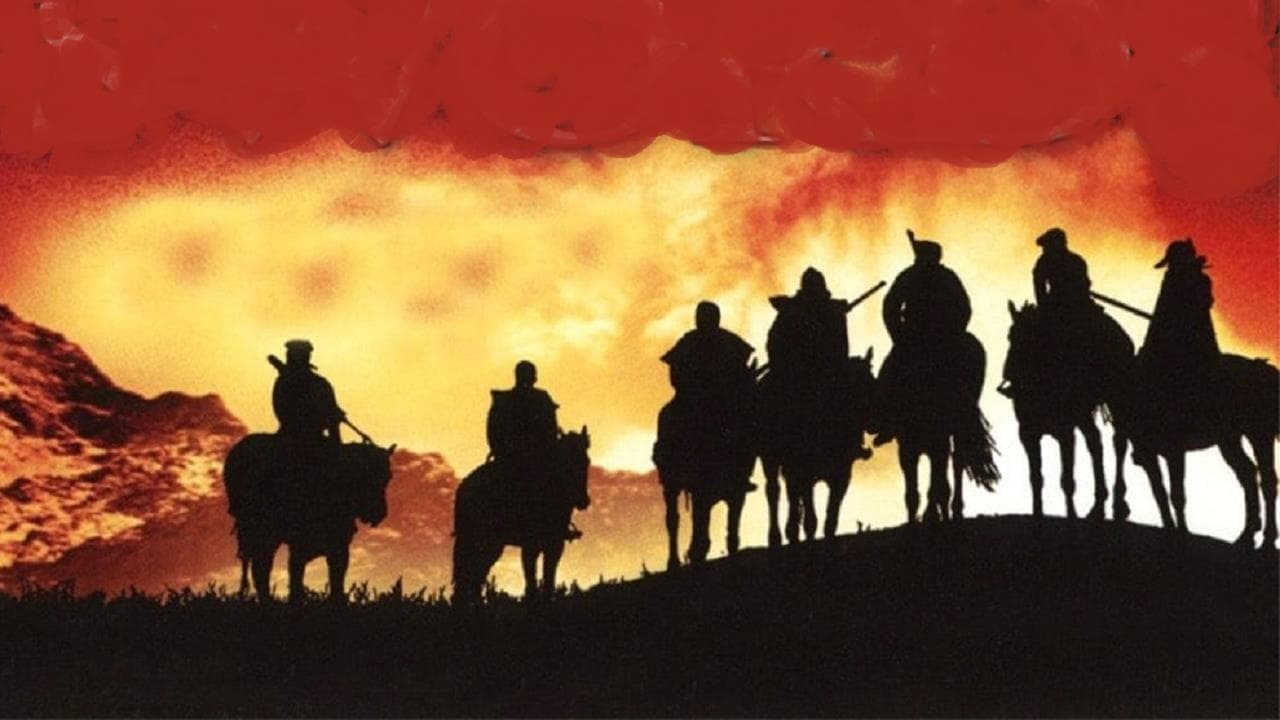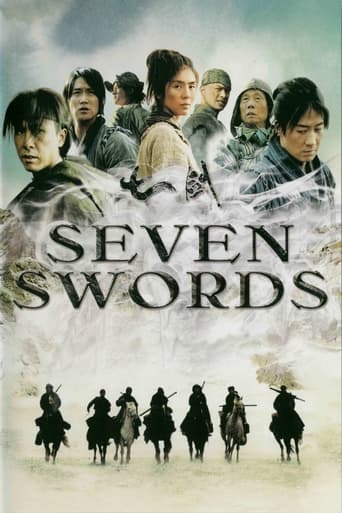

When I first heard about SEVEN SWORDS, I imagined it to be another re-imagining of the classic SEVEN SAMURAI, about a bunch of disparate warriors defending a village from an evil warlord. In essence, this is exactly what the film is, but it bears little resemblance to the Kurosawa classic, and for me that's a good thing. Instead the film chronicles a running battle between seven warriors armed with mystical blades and all the bad guys of an army they're up against. This being a Tsui Hark film, it's got a long running time, is visually sumptuous, and packed with stirring music and top-notch technical values.The actors are all pretty decent in their respective roles. My only complaint is that the film didn't really need seven heroes – they're too many, even despite the long running time, and some of them hardly get a look in (I'm thinking of the bald guy). Donnie Yen headlines the cast and does his usual posturing and fine fighting, and the final battle is pretty much left down to him. There are also some high quality performances from other cast members, notably Honglei Sun's developed villain, Fire-wind, and the girl who played Green Pearl. It's also fun to see Liu Chia-Liang back on screen, looking exactly the same as he did in DRUNKEN MASTER II.The film has a distinctive visual style and Hark seems to have been hugely influenced by the landscapes and costumes of RETURN OF THE KING. That's no bad role model. Especially at this film's beginning, before you get used to it, the colours are amazing, with washed-out, drab grey landscapes and vibrant red banners and costumes. The set design is spot on, and particular attention has been paid to the weaponry. The heroes all have wicked-looking swords, which make noises, act like magnets, and they each have their own unique values; indeed the swords are as much characters as the actors holding them. The bad guys have plenty of wicked-looking weaponry adept at slicing the limbs and heads off the innocent, and as a result this is a fairly graphic film, although Hark plays down the violence by always focusing away on it (we'll see a leg falling on the ground, but not the act of it being chopped off). One of the weapons reminded me of the flying guillotine.Of course, this is primarily an action film, and it delivers action in spades. I'd heard that there was a lagging middle, but I was engaged and entertained throughout. The fights are on a large scale and ably incorporate wire work and standard 'grounded' kung fu, and it's all very enjoyable and hard to take your eyes from the screen. I've always considered Hark's choreography to be a little over-stylised – to the detriment of being able to make out what's happening before your eyes – and that complaint sticks here, but it's a personal issue and most will love the many battle scenes. So, on a final note, this is a massive, expensive and very well made action fantasy that delivers a fitting bland of drama and action.
... View MoreSeven Swords continues the proud wuxia film tradition by being utterly gorgeous, full of martial arts battles, making little to no sense whatsoever plot-wise, having the actors hamming it out constantly, yet containing subtle philosophies concerning the matter of control versus guidance, the capacity for violence used to protect and vice versa.It's also a rather great adaptation of Akira Kurosawa's Seven Samurai, borrowing its central plot, but giving it a more mythical approach and style in a true wuxia fashion.The best part of this film are its production values and art style. The whole film look amazing, but is given a bit more grounded style compared to other wuxia films that are usually awash with colours, loud and bombastic with details. There's still extravaganza, but it's darker, more threatening in style. One of the most enjoyable aspects of this are the weapons, both those used by the villains that are more bizarre and outlandish in design, and the actual Seven Swords from Mount Heaven. They straddle that thin line between being interesting and creative and being just functional-looking enough that you can buy them.The story itself is unfortunately nothing special. It contains some really good moments, but also some really bad moments. The fighting and the emotions are genuine and real, but the clichés and melodrama drag the other scenes down. Seven Swords is worth a watch if you're into wuxia films, or if you're looking for a good fantasy adventure.
... View MoreWow. This film starts out so well and ends up sssooooo wrong! The opening sequences of the film are painfully violent and beautifully filmed, suggesting that we are in for a ride through the mythic landscape of an ancient warring China. Theis promise starts to slip away during a journey to the Mountain of Heaven t find the fabled swordsmen there, when the continuity begins to crumble. Well, Chinese narratives tend to have somewhat different sense of continuity than those in the West, so I continued to hope for the best. There followed a nice fight sequence to save a village threatened by an Imperial army. There was a pretty decent follow-up as the swordsmen met the army in its own lair.Perhaps the film should have ended there, because it went straight to hell thereafter.The middle is entirely muddled with turgid, and for the most part unnecessary, dramatics and melodramatic plot twists. Donnie Yen's character especially gets convoluted beyond recognition. The villain remains fascinating throughout, but he seems to have wandered in from another film, "Burning Paradise," and he keeps looking for the director of that great film, Ringo Lam, who unfortunately never shows up.The film never recovers, and the grand finale is wholly unsatisfying.The problem seems to be a failure on director Tsui's part to decide whether he wants to make a realistic epic or a grand operatic myth. Lam, in "Burning Paradise," was able to merge the two only because he allowed the conventions of the martial arts film to determine the limits of the realism of his depiction of the myth. Thus the characters and their actions retain a larger-than-life feel throughout the grisliest realism in the depiction of the violence.But Tsui's characters never rise to the level of the myth of their origins. Thus they feel limited not by convention but by physics and psychology. That might work in another film; while watching the final fight between Honglei Sun's villain and Donny Yen, I was reminded of the brilliant duel between Yen and Jet Li in another Tsui Hark film, "Once Upon a Time in China II." But the contest in "Seven Swords" seems so small in comparison; we feel no investment in the character of either fighter here.Such a promise, so poorly realized!
... View MoreIf the action scenes were removed, this film would have been painfully boring.With the film reaching a very long and tedious 2 hours and 20 plus minutes, I expected the movie to be at least logical. However, some scenes outright stupid or ludicrous. For example, why would someone even pay for the heads of children and women when the imperial edict was to ban martial arts? So the bandits just attack helpless villagers and get paid? Then there was a scene when the leader said to free the horses so the villagers can escape. Why would do that? Then when the two swordsmen freed the horses, one horse named Rifle, was following them. The two swordsmen had to hurry and hide from Rifle. But after they can't see the horse anymore, one of the swordsmen hurriedly and repeatedly shouted out the horse's name, presumably to say goodbye. Stupid. I thought they were trying to hide awhile ago from that same horse? How about when Green Pearl and the other swordsman decided to go to the general's fortress to loot its gold? How could the two quickly get out of the cave when the whole place is under siege with cannons and the general's army is all over the place? Then the two was immediately back in the general's fortress. Then, surprisingly, the general is back in his fortress with his army and cannons no less to surprise the Green Pearl and her companion swordsman. That was some fast transportation back then, eh? Maybe I fell asleep watching this overly long movie so I missed the explanations for the above scenes. Given that if you take out the action scenes, the film would be boring, I would not be surprised to fall asleep in the first place.The cinematography is OK, although the viewer can see the obvious camera filters effects that were used. In many scenes, the "afternoon effect filter" was so obvious that even plants had the orangy/afternoon lighting on top and normal color on the bottom.Over all, the film is mediocre and trying to be "artistic" but came out flat, illogical, and boring. The action scenes were entertaining and bound to wake up the viewer. The rest of the film is bound to make the viewer fall asleep.
... View More